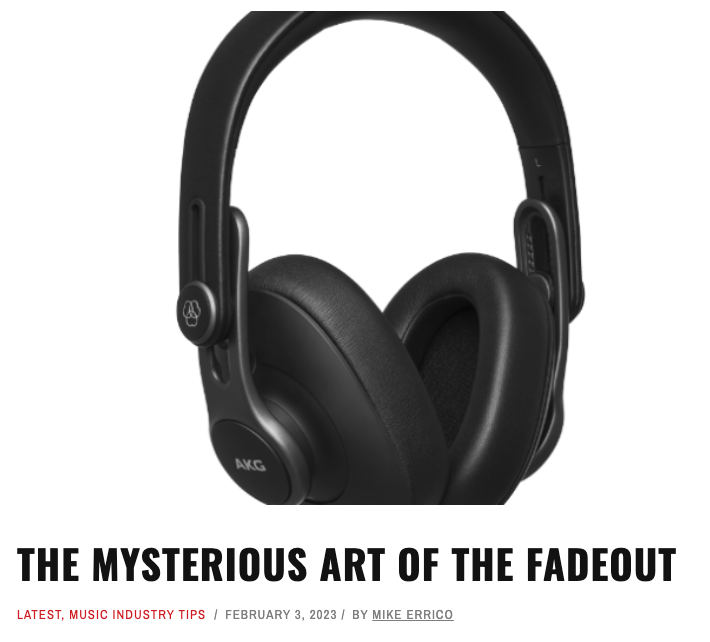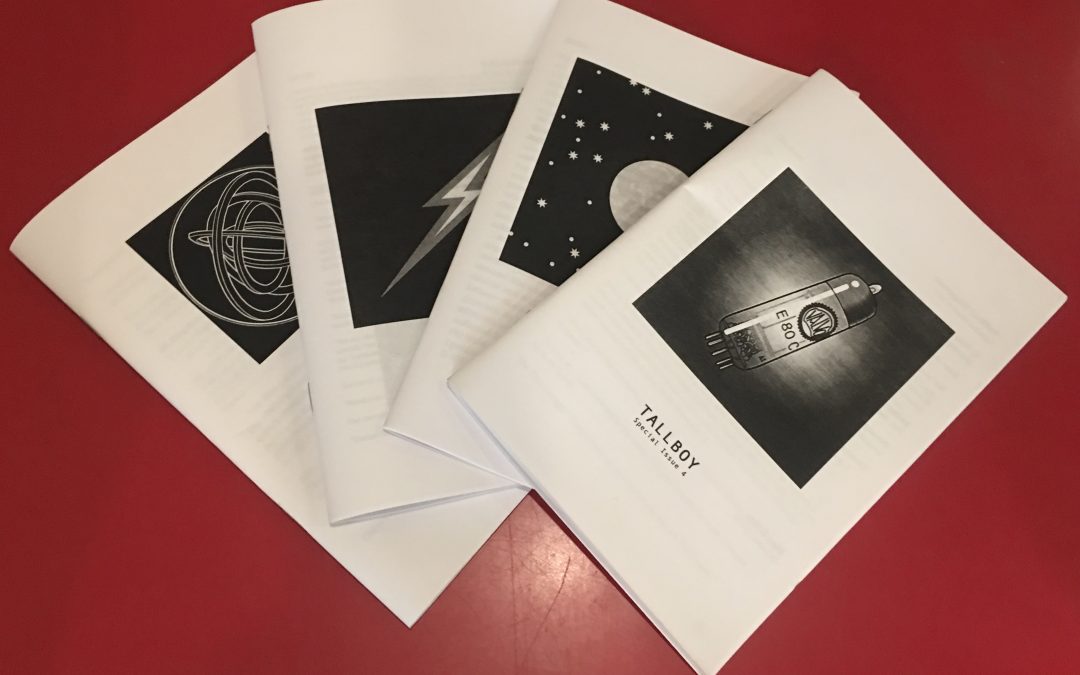
by Mike Errico | Feb 3, 2023 | Books, Lessons, Music Lyrics and Life, Text Journalism
Excerpted from Music, Lyrics, and Life. The popular expression, “You never get a second chance to make a first impression,” has a less-celebrated corollary: You don’t get a second chance to make a last impression, either. A major songwriting challenge is how to construct those first and last impressions in order to bookend the musical universe writers have created. Unlike artists who work in other forms (novels, paintings, etc.), songwriters have a tool that takes advantage of the audio medium: the fade out. Part technological, and part metaphorical, the fade out can imply continuity—the song goes on forever—as easily as loss—the song goes on forever without you. One reason a fade is so expressive is because it reintroduces us to the universal language of silence—fade outs remind us that, as in life, silence always gets the last word. There’s just one problem: At the moment of this writing, fades are very out of fashion. I teach songwriting at several universities, and when a student of mine uses one, they get applause from classmates for the audacity. Fades are retro. They’re vintage. They’re even cinematic, which is actually true: the term “fade” is borrowed from film, which originated around the same time as recorded music. The gradual deprivation of sound in a fade out parallels the deprivation of sight when a scene “fades to black.” In order to better understand why writers and producers choose to fade, I spoke with Jim Anderson, producer and sound engineer; former president of the Audio Engineering Society; multi-Grammy Award–winner; and nominee (along with partner Ulrike Schwartz) for this year’s Grammy for Immersive Audio Album, Jane Ira Bloom’s Picturing the Invisible: Focus 1....

by Mike Errico | Oct 13, 2022 | Text Journalism
Inside Fender’s Plan to Rock the Guitar Industry With New Hits and Classics CEO of Fender Musical Instruments Andy Mooney is placing bets on new avenues and repeat performances for an iconic American brand. By Mike Errico October 12, 2022 “At my very first town hall in Scottsdale, I’m getting introduced as the new CEO, and all they know about me is that I’ve worked at Nike, I’ve worked at Disney,” Fender chief executive Andy Mooney begins, settling into a story enhanced by his gruff Scottish accent. “And I start to tell them about the first Stratocaster I had, and how I modified it to place the metal pickup down like [Deep Purple guitarist] Ritchie Blackmore did, and how I added the extended tremolo bar, and so forth. And at the end of the presentation, one of the more tenured employees came up to me and says, “I really thought I was going to hate you…but you might actually get it.” He deadpans, “Which I took as a compliment.” In the midst of a very uncertain historical moment, guitars have been having a good run: the pandemic spiked instrument sales, reinvigorated hobbyists and broadened the fanbase to include new players. But this is more than a business success to Mooney, who spent his twenties pursuing a career as a professional musician before taking on corporate roles. He remains an avid guitar collector (he had his eye on Pink Floyd guitarist David Gilmour’s coveted Fender before it fetched a record price at auction), and since 2015, he has balanced a sensitivity to history with a sharp eye toward what’s next for the iconic brand....

by Mike Errico | Sep 9, 2022 | Music Lyrics and Life, Text Journalism
American Songwriter is running an excerpt from Music, Lyrics, and Life. This time, it’s my interview with Nashville super-producer Jay Joyce about how to embrace, and even create, beautiful mistakes. I was proud of this one: Jay Joyce and the Power of Mistakes By Mike Errico If there’s anything that’s gotten more powerful in the songwriter’s toolbox, it’s the ability to erase blemishes. Writers and singers—especially singers—hide flaws with ever-improving software, thinking the song will benefit from perfection because that’s what the listener wants. Jay Joyce has been fighting this songwriting tendency and pumping out perfectly imperfect songs for years. His studio, a converted church in East Nashville, was constructed specifically to catch what makes a song’s performance real, and in this way, he’s crafted hits for Miranda Lambert, Eric Church, Orville Peck, Brandy Clark, Declan McKenna, Carrie Underwood, Keith Urban, and a host of others. His philosophy—keep the mistakes—sounds retro, maybe even careless; and yet, Jay’s approach bypasses the sterility of modern songwriting, and creates music that is urgent, dangerous, and alive. It’s as if mistakes are the future of authentic art. Mike Errico: How do you get the best work out of writers and artists? Jay Joyce: I don’t have a vocal booth. People come in, and they’re like, “Where do I sing?” And I’m like, “Wherever you want.” I don’t have a control room—I never did like that. We don’t have to be, like, “Put your guitar down, come into the control room.” I can go on about the way studios are designed. It’s just stupid…. READ THE REST AT AMERICAN...

by Mike Errico | Jan 3, 2022 | Books, Music Lyrics and Life, Teaching, Text Journalism
This is a great one, written by Matthew Wang. Congrats on your book, Music, Lyrics, and Life: A Field Guide For the Advancing Songwriter. Can you talk about some of your former songwriting students, some of whom are interviewed in the book? First off, I’m grateful that so many of them came out to be a part of the book—and that includes you, my friend. I really think of us as a team, and I spend a lot of time trying to find opportunities to connect former students to each other. There’s an Instagram account dedicated to the amazing stuff everybody’s doing, and there’s also a Facebook page where we share job opportunities, gear, etc…, but that one’s secret. Can songwriting be taught? Partially, yes. And to a specific subsection of the songwriting community, absolutely yes. Mke Errico connects through songwriting. (Photo Credit: Stan Horaczek) Of course, there are the people who walk into my class with an innate gift of how melody and structure flows, and for them, sometimes all I can do is encourage them to finish as much as possible, and to challenge them to stretch into areas they hadn’t considered. Which, frankly, is a lot. But the writers I can help most obviously are the ones who are maybe not as gifted naturally, but who make up for it by being hell-bent to be a songwriter. They’re early for class; they set up weekly office hours; they apply for all the internships; they co-write with everyone they possibly can; they wake up in the morning wondering how they can get better. I work hard to...

by Mike Errico | Nov 7, 2018 | Books, Stories, Teaching, Text Journalism
I have been putting Tallboy magazine out for years. It went digital for a while (we called them “blogs”), but that never felt right. This special four-issue, 164-page series was part of a crowdfunding campaign for my 2017 release, “Minor Fits.” In it, you’ll find short fiction (some of which I’ve told on stage); backstories about my most well-known songs; and confessions from the music industry—so it’s funny and full of idiots. Now that “Minor Fits” is out in the world, I’m offering the entire series on Bandcamp. I’ve put the same craft and quality into this that I’ve put into my music, and I hope you’ll check it out. Includes unlimited streaming of You Shook Me All Night Long (AC/DC cover) via the free Bandcamp app, plus high-quality download in MP3, FLAC and more. BUY TALLBOY MAGAZINE AT...

by Mike Errico | Jun 8, 2016 | Press, Text Journalism
Check out my conversation with Fast Company about “Formation,” songwriting, and the rise of “The Superchorus.” Excerpt, plus lyric and structure breakdown, which got kind of complicated…: “It feels new because you get a little bit lost in the form—you’re not being catered to,” says Mike Errico, a singer-songwriter and adjunct instructor at New York University’s Tisch School of the Arts. “[Producer/songwriter] Max Martin is very much a caterer—he’s a good escort and he’s a reliable narrator, musically. But this is actually pushing it. You don’t have control of the plane. That’s something that’s exciting about this.” What’s happening in “Formation” is what Errico describes as not necessarily a break from the traditional verse-chorus form, but an evolution of it. “I do suspect that the way present-day songs are conceived does impact the ways writers chose to innovate,” Errico says. “For instance, if you are writing a melody over a groove that is static, looped, and extended out—a process referred to as ‘toplining’—a creative mind will accept the track as an unmovable parameter and generate interest by changing up the melodies and hooks. At the end of a topline session, the writing team may have several sections they love, but instead of tossing them out in order to preserve preconceived notions of song form, they will line them up and make multiple hook-laden sections out of each.” VERSE 1 Y’all haters corny with that Illuminati mess Paparazzi, catch my fly and my cocky fresh I’m so reckless when I rock my Givenchy dress I’m so possessive so I rock his Roc necklaces PRE-CHORUS My daddy Alabama, my ma Louisiana...







